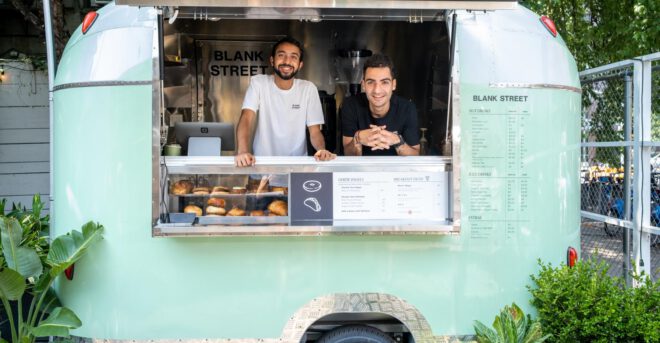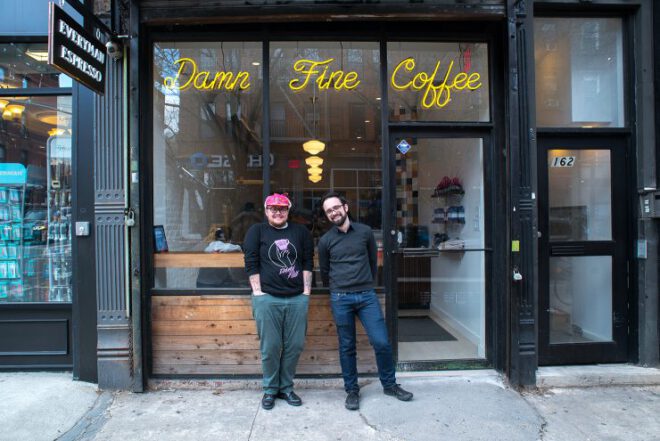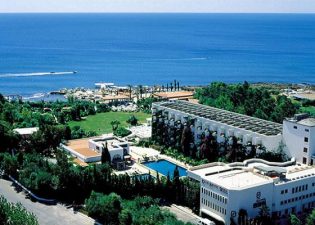
Blank Street serves coffee out of retro carts which are a cross between a food truck and a mobile cart. Photo Lana Apisukh.
It often takes plucky new immigrants to see a missing link in business. Two pals from high-school, Issam Freiha and Vinay Menda who went to the American School in Dubai are a first to get American venture funding for their coffee startup, Blank Street. They secured $25 million USD in Series A funding to roll out more than 100 coffee shops in the New York area offering no-nonsense, even homey, design with great coffee. This is not Turkish coffee from a finjan, made famous in the Middle East, but espresso coffee made on Italian machines.
The coffee is reported to be good but not everyone is happy.
A coffee rival to Dunkin Doughnuts, Starbucks
Appearing already all over New York and served out of converted vans, a cross between an Airstream and a Vespa, which give the impression of a quaint small business –– but also out of simple storefronts –– Freiha and Menda have developed a model for making great coffee at a lower price point than Starbucks.
While some people may enjoy the convenience of a Starbucks alternative, others such as David Lieber and patrons to small coffee shops like Everyman Espresso –– a chain of 3 boutique coffee shops in New York –– see it as a targeted takeover of local coffee and, possibly, the values that keep the East Village, Brooklyn or New York City hip.

Owner and CEO Sam Penix with CFO and co-owner Sam Lewontin. Via Sprudge
Lieber lamented over what he saw as Blank Street’s takeover of the Everyman neighborhood standby. He told the New York Times: “They opened right across the street from Everyman,” he said. “That’s not a coincidence.”
Eater NY comments: “The ubiquitous mint-green coffee chain Blank Street is taking over New York with its unescapable blah-ness.”
I find this story interesting and with many layers. On one hand it’s an immigrant success story, and something American immigrants have been doing for the last 100 years in all sorts of business and banking. And they are guys from the Middle East. They should have a fair chance like everyone else.
When hipsters call the shots
But now the gentrifiers who have resettled islands in Brooklyn, and those who have held out in Manhattan, want to keep big corporate out. Are any of the people who buy from boutique coffee shops working for big corporate? Do they bank with them?
There is some merit to resisting change, and to protecting small businesses, but at one point can cities get involved in healthy competition?
A very successful but small organic grocery store, Teva Tari, opened in my neighborhood in Jaffa, Israel more than 13 years ago. During Covid the place was packed. Soon after the mask mandates started to wane, a neighboring convenience store selling chips and fast-food items saw its neighbor’s success, studied it, and decided to open a small organic grocery store selling almost exactly the same merchandise, one street over.
They then multiplied to another location affecting the business of the pioneering shop.
That’s the way cities grow and certain shops end up clustered in certain neighborhoods. Maybe good for carpets, furniture, lamps and textiles but for local markets or coffee shops? Do we want our organic food and better coffee shops governed by big corporates and their investors?
When big capital acts like a boutique business
I don’t love that Blank Street, like other coffee brands I have seen in cities like Tel Aviv, are building retro-looking vans and trucks that trick the psyche of people into associations with boutique food truck businesses.
The old chip truck or food van are holdouts for people who don’t want to work at Walmart or at a corporate anything. Selling venture coffee out of a retro van is like selling industrially-grown apples at a chain grocery store labelled: Farmers Market. I see those in Canada.
As always in this confusing over-capitalistic world, let the buyer beware and if there is a doubt, just put your money where your mouth is. And consider drinking a little less coffee.



